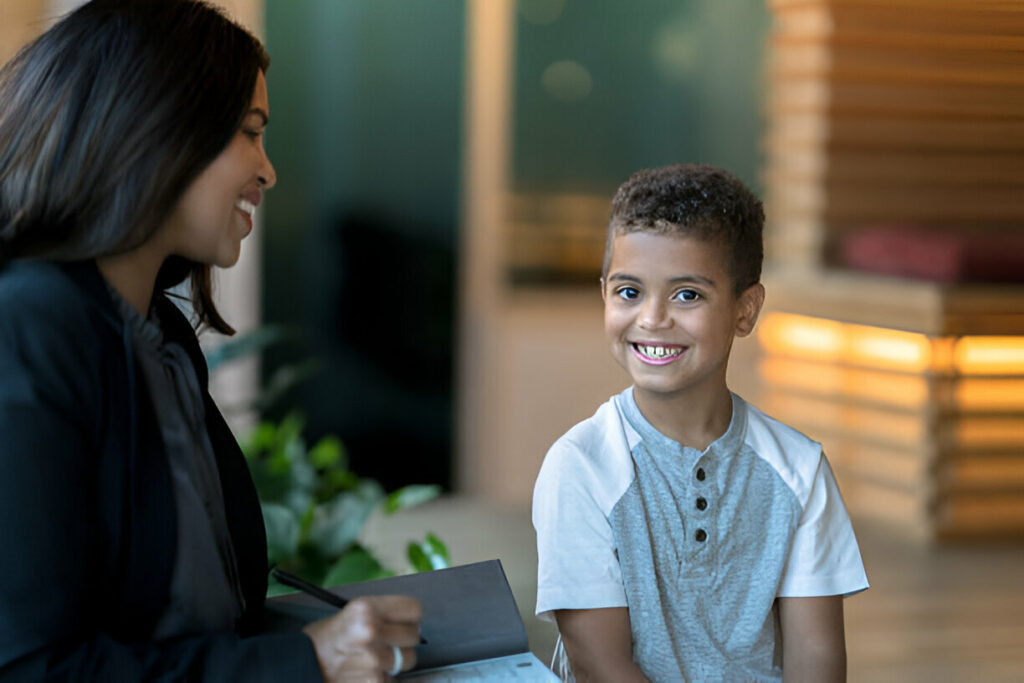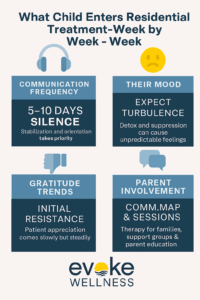When your child enters a residential treatment program, your world shifts. You’ve taken a huge step toward their healing, but it can feel like you’re alone on a vast ocean—aching to know how they’re doing, fearing every silence. These worries don’t make you weak. They show how much you love them. You’re their anchor, even from afar.
At Evoke Wellness Ohio, we’ve walked alongside countless parents in this same place. We see the heartbreak, the hope, the uncertainty. You’re not alone. Here’s what you can expect in these deeply emotional weeks.
Communication: How Often Will You Hear From Them?
Contact begins slow. In the first 5–10 days of a residential program, your child may not reach out—because they’re finding their balance. This is when physical stabilization, detox, and orientation happen, and communication may feel distant.
Once they settle, you might receive bi-weekly calls, scheduled video chats, and updates during family therapy. These are structured, so they help your child focus while keeping you part of their journey. Staff also check in with short progress calls—so while it may feel slow, you’re not shut out.
Understanding Their Mood and Behavior Changes
Expect emotional turbulence. Detox releases long-suppressed feelings: anger, guilt, sadness, even shame. During group or individual therapy, old wounds may resurface—tears, frustration, confusion. One day they might feel strangely calm. The next, they seem distant.
This rollercoaster isn’t a setback—it’s healing in motion. Emotional processing can be useful, even necessary. The walls they’d built won’t crumble overnight. But, under safe care and with support, they’ll begin to rebuild healthy ways to cope.
Will They Thank You Right Away?
It’s normal if they don’t. Early in treatment, they may feel resentful or defensive, especially if entering the program wasn’t fully their choice. They might say they hate being there or blame you for “making” them come.
But that’s okay. It doesn’t mean they’re not healing. Many young adults look back months later with deep gratitude—when they realize the space for surrender allowed something better to grow. Your role? Be patient, steady, and rooted in your love.
Your Role: How Involved Will You Be?
You’ll have a voice and a role—but it’s not about fixing them. Most programs plan:
- Weekly or bi-weekly family therapy sessions
- Psychoeducation for parents on addiction and relapse prevention
- Communication skill-building
- Support groups for parents
These are safe, structured spaces—not blame sessions. They’re designed so you can understand your child’s progress, learn how to support them without enabling old patterns, and prepare for life after treatment.
Limited Technology: Phone and Social Media Usage
Early on, phones and internet access are limited or forbidden. This helps your child stay focused—healing is easier without the pull of outside stress or temptation.
This silence can hurt. But as they heal, access returns under structured terms. Soon enough, you’ll hear from them. And when they do reach out, that contact will likely feel deeper, more honest—because they haven’t just dialed your number, they’ve dialed in emotionally.
Snapshots of Their Daily Life in Treatment
Worried treatments are just therapy all day? Far from it. Their days may include:
- Morning check-ins or mindfulness groups
- Individual counseling
- Group therapy
- Family sessions
- Fitness or recreation
- Skill-building workshops
- Creative outlets like art or music therapy
- Evening reflections
It’s structured. It’s consistent. It gives them room to feel, make mistakes, try again—and learn how to live differently.
Preparing for Aftercare Transition
Treatment isn’t an end—it’s a bridge. Before discharge, the team will help with an aftercare plan tailored to your child’s strengths and needs. Options may include:
- Outpatient therapy
- Intensive outpatient (IOP)
- Sober living
- 12-Step, SMART Recovery, or alumni programs
- Continued family counseling
You’ll be part of these conversations. You’ll know what the first 30, 60, and 90 days after treatment look like—so it isn’t an abrupt stream cut. It’s a lifeline.
Relapse Concerns: What if It Happens?
Your heart leaps at the word “relapse.” It’s common and scary. But relapse doesn’t erase progress—it’s a signal that more help is necessary.
At Evoke Wellness Ohio, we say: relapse is not failure. It’s a sign to adjust the plan, reinforce supports, or try a different strategy. Alumni always have open access to re-enter. Healing isn’t linear—and that’s normal.
You’re not alone in this. Call (866) 430‑9267 to learn more about our residential treatment program in Hilliard, OH. Your child’s crisis doesn’t define them. Help is a call away.
FAQs: Burning Questions Parents Ask About Residential Treatment
Q: Will my child be safe and supervised 24/7?
A: Yes. Residential programs like ours have trained clinical and support staff on-site day and night. Your child isn’t just medically supervised—they’re cared for emotionally and socially, too.
Q: When can family visits or calls begin?
A: Most centers schedule first family interactions after the first week or two—once your child has had time to orient. From there, family visits or calls become regular parts of treatment.
Q: Can parents join therapy sessions?
A: Absolutely. Family therapy is a cornerstone of recovery. It promotes healthier communication, helps clear misunderstandings, and allows you to work collaboratively with clinicians.
Q: How long does residential treatment usually last?
A: Length varies on individual needs. The gold standard is 30–90 days. Programs may begin at 30 days with optional extensions based on progress and clinical recommendations.
Q: What if my child doesn’t want to talk about feelings?
A: They might not at first—and that’s okay. Residential treatment doesn’t rush emotions. Therapists gently help them open up over time, creating safety before push.
Q: How will I know they are progressing?
A: You’ll receive regular updates from the treatment team during scheduled family calls or check-ins. You’ll see emotional stabilization, improved mood, better sleep, more clarity, and insight emerge over time.
Q: Can I visit them in-person?
A: Programs normally schedule family visits—weekly or biweekly—based on clinical needs and logistics. Visits are structured and prepared, helping ensure the environment remains therapeutic for everyone.



